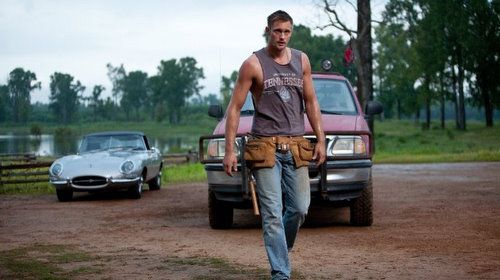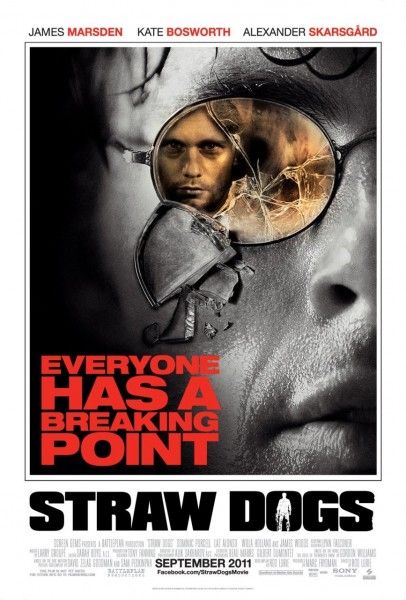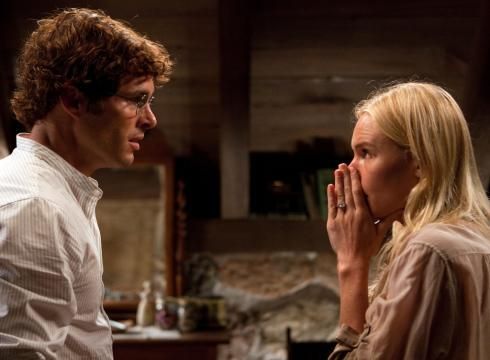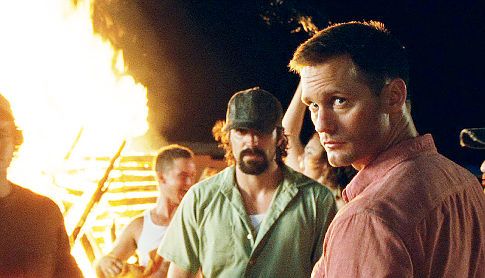When director/screenwriter Rod Lurie and his producing partner, Marc Frydman, decided to revisit Sam Peckinpah’s controversial 1971 film Straw Dogs, starring Dustin Hoffman and Susan George, the goal was to tell the same basic story, but from a different philosophical perspective. Instead of saying that all of us are intuitively violent human beings, this version takes the approach that man is conditioned to violence.
During a recent exclusive phone interview with Collider, Rod Lurie talked about his desire to relocate the film in the American South to make the film more relatable, why he decided to cast actors to play against type, how he used test screening audiences to gauge how far they could take things, and that they kept the mood light on set, between takes. He also talked about the drama series he plans to develop for NBC and how he’s close to setting what his next feature will be. Check out what he had to say after the jump.
Here’s the film’s synopsis:
Hollywood screenwriter David Sumner (James Marsden) and his actress wife Amy (Kate Bosworth) move to her small hometown in the Deep South after her father’s death, with the plan to prepare the family home for sale. But, the arrival of the Sumners stirs up long-dormant resentments and suspicious actions, and tensions build in their marriage as old conflicts re-emerge with the locals, most notably with Amy’s ex-boyfriend Charlie (Alexander Skarsgård). Charlie and his former football teammates push the limits of David’s tolerance and the Sumners’ marriage, forcing them to re-evaluate each other and their relationship. Before too long, a series of events occur that ultimately lead to an explosively violent confrontation that will shatter the lives of everyone involved.
Question: How did this remake come about for you?
ROD LURIE: The point of remaking Straw Dogs is not to replicate the philosophies of Sam Peckinpah, at all. What made that film singular was the attitude that he brought to the characters. Oddly enough, that’s the one thing that I really wanted to change. I didn’t necessarily want to have Peckinpah’s theories on man being genetically violent permeate my film. In fact, I have precisely the opposite idea of man. I think that man is conditioned to violence. So, what you’re doing is basically telling the same story, but from a different philosophical perspective, and I thought that would be a curious experiment to try to do that.
What were your thoughts about the original film?
LURIE: My primary feeling about the original was that Peckinpah was saying that all of us are intuitively violent human beings, and that violence is going to pour itself out, at some point. In fact, he was a follower of a guy named Robert Ardrey, who wrote a book called African Genesis, and then one called The Territorial Imperative, which said exactly that and was the reason why Pauline Kael called the film “a fascist work of art.” I don’t necessarily agree with an assessment that harsh, but that was her reasoning. I simply have a different point of view of human kind.
Did you just have the idea to do this, or was this idea brought to you?
LURIE: This film idea was actually brought to me by my business partner, Marc Frydman, who I had done almost all of my films with. Simply, the opportunity had presented itself. The option on Straw Dogs, which I believe had been owned my Miramax, was expiring. We were very hesitant until I ran into Dustin Hoffman, who told me, “You know Rod, it’s a Western. If you could just imbue it with your own philosophies, perhaps you might really have something.”
Having been a film critic, did that make it easier to tune out what everybody writes, in regard to you deciding to do this?
LURIE: It’s interesting you should ask that because, from the split second that this movie was announced, every blogger that there was came after me voraciously and they alerted me that I was no Sam Peckinpah and that I couldn’t carry his jock strap, and so on. But, that was absolutely expected. The movie will speak for itself, and so far, so good with how it’s being received. Frankly, I think that Sam himself would be rather happy that this was being done. I’m not saying he’d like the movie. I just think that he’d like the fact that, as a result of my movie coming out, his movie is now coming out on Blu-ray, and the book upon which his movie was based is now being re-released. I guarantee you that more people are going to see the original Straw Dogs now than saw it in its entire run.
What was your starting point, in approaching this subject matter? Did you decide to change the setting first, and then work the rest of the film around that?
LURIE: I definitely wanted to change the location because I thought that it would be extremely anachronistic to set it in a town like that, in Great Britain. And I wanted to make it more relatable, not just to American audiences, but to international audiences. International audiences are somewhat attuned to the American style through cinema and literature, so it’s not at all foreign to them, from a literary point of view, and it’s something that’s more relatable. I also wanted my film to have, oddly enough, a less bleak look to it. The washed-out look of the original was extremely appropriate to what Peckinpah was trying to do, but antithetical to what I was trying to do.
What led you to cast James Marsden and Kate Bosworth for these roles?
LURIE: Everybody is playing against type. I think I’ve done that in most of my films. I find that a delicious idea. One of the reasons why I cast James Marsden is that he’s so unlike Dustin Hoffman. If I had gone with one of those actors who was “Hoffman-esque,” I think that actor would have had an impossible burden. So, I decided to go with somebody much more out of the Redford or [Paul] Newman school of acting, which is where I think Marsden comfortably lives. By the way, he’s a fantastic mimic. He can do impersonations of anybody. So, sometimes in take four or five, when we knew we had it, he would do the scene as Dustin Hoffman. The problem was that often those were the best takes that he had, but I couldn’t use them. One of the principal differences between the two films is that I really like to see my films as very feminist-oriented. I was just nine years old when Straw Dogs came out, so I can’t really speak to the women of the time, but I can tell you that the women of 2011 are not put-upon and they’re not victims. The women of today – particularly American women – are independent, fierce and strong-willed, and so is that character. That character is, by no means, pathetic and women are really digging on the film, quite a bit.
Why did you decide to connect Kate Bosworth with Susan George, from the original film?
LURIE: I checked with Susan George and she said that she would be delighted. I think she sees her now as a sister, and they’re forever linked. When I ran into Dustin Hoffman at an Oscar party, I was with Kate. He looked at her and the first thing he said was, “You know, you could play Susan George in The Susan George Story.” I thought that was pretty amusing.
How did you come to choose Alexander Skarsgard to play a jock from the South?
LURIE: I had never seen True Blood, but I did see him in the mini-series Generation Kill, so I knew that there was some instinct in him to be a rugged Southerner. When I met with him, he promised me that he would do everything he could to get there, and I like his pedigree, with who his father is. At the time, he wasn’t anywhere near as famous as he is now, so that was pretty interesting.
Why was it important for you to give the villains reasons behind their behavior?
LURIE: Somebody – and I’m going to guess it was Hitchcock – once said that everyone has their reasons. If you remember that, as a writer, you’ll write better than average villains. He has his reasons. They’re pretty fucked up and maybe delusional, but they exist, for sure.
When you do a film like this, with this type of violence, it definitely can’t be subtle. Is there a point where you draw the line, as far as how far you can take it?
LURIE: No, I don’t. I’ll tell you who does: test screening audiences. You learn quite a bit about your film from test screening audiences. With both comedies and movies that are as intense as this, you need to calibrate the film and see how audiences react. I want to have a movie where people’s eyes are glued to the screen, not when they’re running from the screen.
What do you think this film says about human nature and what we’re capable of, as human beings?
LURIE: What it says about human nature is that we’re all capable of being violent, but we have to be conditioned that way. It’s not something that’s actually necessarily deeply rooted inside of us. It’s not biological, it’s conditioned.
While you’re making a film like this, that’s essentially an intense exploration of human nature, how do you keep the mood on set?
LURIE: You have actors like Marsden, who’s doing impersonations of everybody. And, Bosworth is just like a hummingbird.
Do you have any idea what you’re doing next?
LURIE: I’ve got a television series idea that has been bought for a script by NBC, and we’ll see where that goes. I’m very interested in now spending a year, trying to put on a television series, as I’ve done before. It’s a fantastic experience and I’d like to have it again. As for motion pictures, there is a movie that is absolutely underway. We’re negotiating right now, but the I’s aren’t dotted yet, so I don’t want to talk about it.
What kind of TV series is it?
LURIE: It would be a drama, perhaps in the military world.




